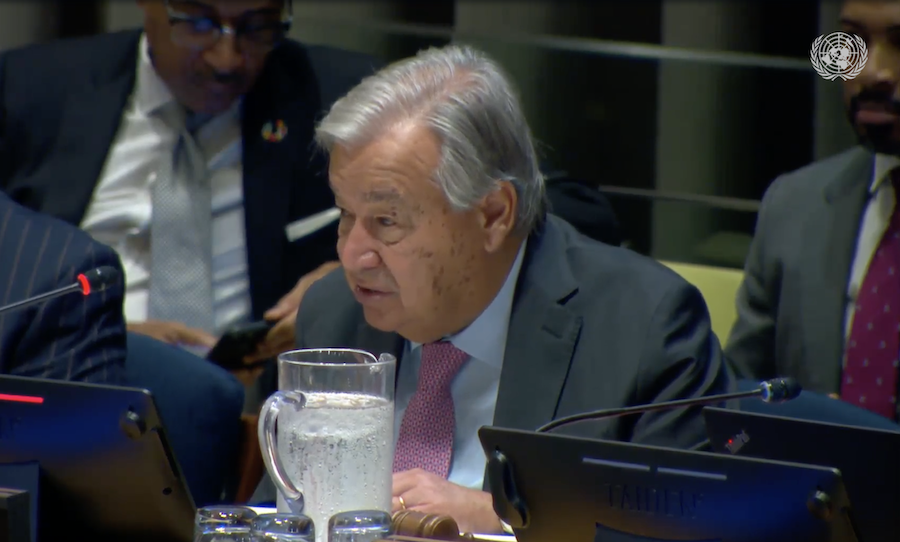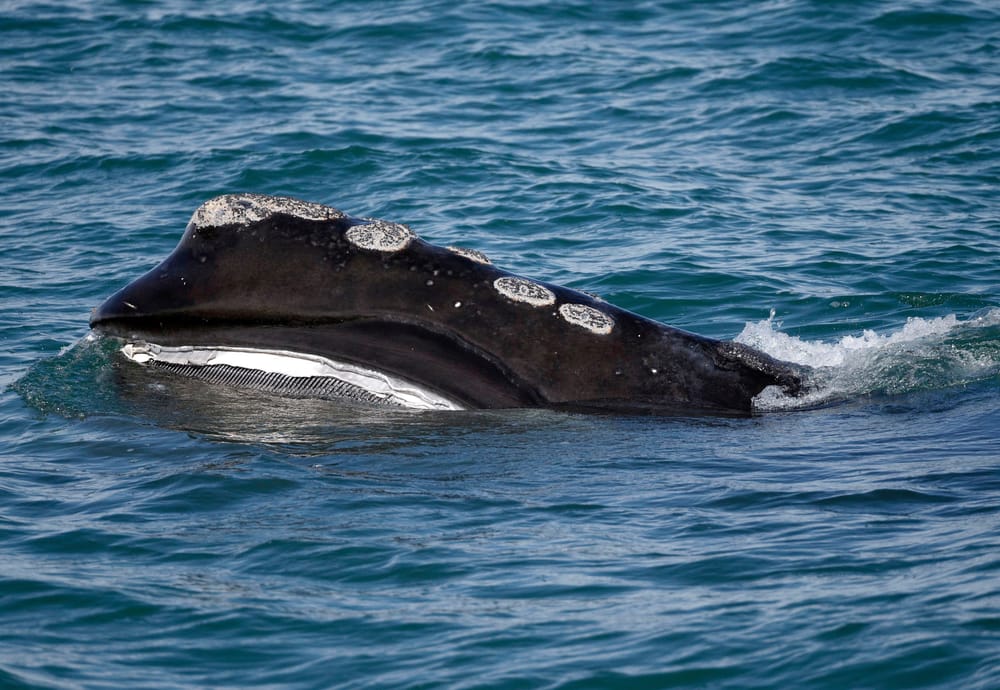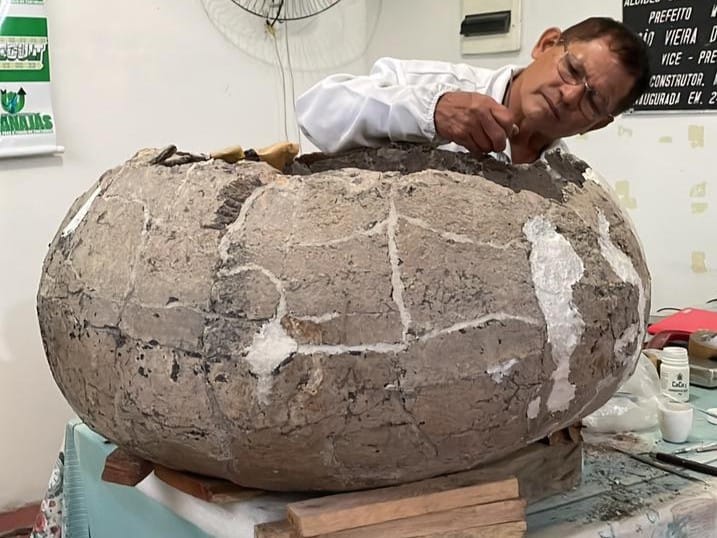Guterres says G20 must 'lead' the reduction of fossil fuels
The Group of 20 largest economies worldwide responds for about 80% of global greenhouse gas emissions

UN Secretary-General António Guterres stated this Wednesday (Sep 25, 2024) that the G20 (a group comprising the world's 20 largest economies) must "lead" the reduction in fossil fuel use.
"The G20, responsible for around 80% of global [greenhouse gas] emissions, must lead and align its fossil fuel production and consumption plans with 1.5°C," he declared in a speech during a panel on sea level rise.
The panel followed the Summit of the Future and focused on building common understandings, political mobilization, and promoting multisectoral and international collaboration to provide solutions for states and communities most affected by sea level rise.
The UN Secretary-General stated that "all countries must submit new national climate action plans or nationally determined contributions well before COP30 next year."
"These plans must align with [the global average temperature rise of] 1.5°C, cover all sectors of the economy, and put us on the path to phasing out fossil fuels in a fast and fair manner," he said.
Brazil is a key global player in both events – G20 and COP30 – mentioned by the Secretary-General.
- In 2024, the G20 meeting will be held in Rio de Janeiro in November, with a series of satellite events taking place throughout the year in different cities across Brazil.
- In 2025, COP30 will be held in Belém, Pará, a state that is part of the Amazon region. (*COP is the Conference of the Parties, the most important global meeting to discuss climate change.)
Financing to meet climate goals
Guterres stated that "money is indispensable" for achieving climate goals:
"We need a strong financial outcome at COP29 this year, including new and innovative sources of capital."
He advocated for "significant contributions to the new Loss and Damage Fund as a step towards climate justice."
He also emphasized that developed countries need to double climate adaptation financing to at least $40 billion per year by 2025.
Guterres further called for strengthening international banks to adopt more innovative strategies against climate change, focusing on developing countries:
"We need a reform of multilateral development banks to make them bigger, bolder, and capable of providing much more affordable financing to developing countries."
A positive development: The United Nations is developing a sea level rise early warning system, which will be accessible to all countries and is expected to protect global populations. It should be ready by 2027.
Guterres delivers speech at sea level rise panel
Since we consider the entire statement by UN Secretary-General António Guterres to be journalistically relevant, we have transcribed it in full.
Here is the full transcript of Guterres' speech at the 2024 UN panel on sea level rise:
Mr. President of the General Assembly, Excellencies, ladies and gentlemen,
Our world is in dangerous waters. Scientists tell us that the global sea level is now rising faster than at any time in the last 3,000 years and accelerating.
The rate of increase has more than doubled since the 1990s. They tell us the cause is clear. Greenhouse gases, overwhelmingly from burning fossil fuels, are heating our planet, expanding seawater, and melting ice.
But they cannot tell us where this will end. That is down to world leaders today. Their choices will determine the scale, pace, and impact of future sea level rise. Temperature increases over 1.5 degrees Celsius above pre-industrial levels could take the world past dangerous tipping points, potentially leading to the long-term irreversible collapse of the Greenland and West Antarctica ice sheets.
In the worst-case scenario, people alive today could witness sea levels rise by meters. Low-lying coastal zones are home to around 900 million people.
For them, rising seas mean a rising tide of misery. More intense storm surges, coastal erosion, and coastal flooding.
Communities swamped, fresh water contaminated, crops ruined, infrastructure damaged, biodiversity destroyed and economies decimated. With sectors such as fisheries, agriculture, and tourism pummeled.
The poorest and most vulnerable are hardest hit. I saw this recently in the Pacific, where cyclones are tearing chunks out of island economies.
In 2015, Vanuatu suffered damage equivalent to well over half its GDP. Meanwhile, in Panama, hundreds of island families have been relocated to the mainland.
In Bangladesh, salt water is polluting drinking water, killing crops, and creating a health threat that can be deadly, particularly for pregnant women. In the city of Saint Louis in Senegal, homes, schools, small businesses, and mosques have reportedly been abandoned to the encroaching tide.
Such events are reproduced across the globe. This is what climate injustice looks like. This is the face of inequity. But the rich are not immune. Advanced economies are spending billions in damages and adaptation.
And without rapid action, we're in for much worse. As the title of today's debate reminds us, for some, this could be existential. The whole islands lost.
Coastal communities are destroyed as lands become uninhabitable and uninsurable. Mass displacement can pile pressure on scarce resources elsewhere. Inflaming already dire situations.
Global trade, food systems, and supply chains will be battered as ports are damaged and agricultural land and fisheries are ruined. Rising seas will reshape not only coastlines, but economies, politics, and security too.
Excellencies, one drastic action to reduce emissions can limit sea level rise. And only drastic action to adapt can keep people safe from rising waters. Everyone must be protected by an alert system by 2027 in line with our early warnings for all initiatives.
All countries must deliver new national climate action plans or nationally determined contributions well ahead of COP 30 next year. These must align with 1.5 degrees, cover all sectors of the economy, and put us on track to phase out fossil fuels fast and fairly.
The G20, responsible for around 80% of global emissions, must lead and align their fossil fuel production consumption plans with 1.5 degrees. Money is indispensable. We need a strong financial outcome at COP 29 this year, including new and innovative sources of capital.
We need significant contributions to the new Loss and Damage Fund as a step towards climate justice. We need developed countries to double adaptation finance to at least US $40 billion a year by 2025 and to show how they will close the adaptation finance gap.
We need reform of the multilateral development banks to become bigger, bolder, and able to deliver far more affordable finance for developing countries. We made real progress at the Summit of the Future. We must keep driving that forward, including at the World Summit for Social Development and the Financing for Development Conference next year.
We must also address gaps in our international legal framework. Concerning sea level rise, to ensure continuing access to resources while protecting existing maritime boundaries, as well as to protect affected persons and in extreme scenarios to address the implications related to statehood.
Excellencies, we cannot leave the hopes and aspirations of billions of people dead in the water. We cannot allow the wholesale destruction of countries and communities. It's time to turn the tide and save ourselves from rising seas.
Thank you
Autor

Jornalista e empreendedor. Criador/CEO do Correio Sabiá. Emerging Media Leader (2020) pelo ICFJ. Cobriu a Presidência da República.
Inscreva-se nas newsletters do Correio Sabiá.
Mantenha-se atualizado com nossa coleção selecionada das principais matérias.



